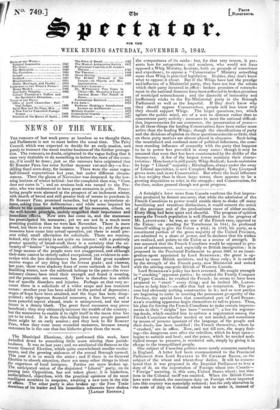The Municipal Elections, duly performed this week, have dwindled down
to something little more stirring than parish- business. It was so last year ; and we attributed the flatness to the recent General Election, which quite overwhelmed smaller excite- ments, and the growing staleness of the annual Borough turmoil. This year it is so much the staler ; and if there is no General Election to absorb attention, there are many other things to blunt the eagerness of local intrigues. Parties are more broken up. The. anticipated union of the disjointed "Liberal" party, on its Pags.ing into Opposition, has not taken place: it is leaderless, objectless, with the practical opinions of its most intelligent members in suspense, awaiting a new turn in the tide of affa. trs. The other party is also broken up : the Free Trade doctrines of its leader and his immediate adherents have shaken flaxen. EDITION.]
the compactness of its ranks : but, for that very reason, it pre- sents less for antagonism ; and numbers, who would not have opposed a Whig Ministry, hesitate, both on grounds of conscience and expediency, to oppose a " Conservative " Ministry something more than Whig in practical legislation. Besides, they don't know what to oppose it about. But if the Whigs have lost the prestige and influence of a Ministerial party, they have not lost the odium which their party incurred in office: broken promises of retrench- ment in the national finances have been reflected in broken promises of municipal retrenchment ; and the discredit of' insincerity and inefficiency sticks to the Ex-Ministerial party in the Borough Parliament as well as the Imperial. If they don't know why they should oppose Conservatives, people still less know why they should support Whigs. The larger questions, too, which agitate the public mind, are of a sort to distract rather than to concentrate party activity : measures to meet the national difficul- ties, improvements for our commerce, the preservation of peace— in all these things the leading Conservatives have been rather more active than the leading Whigs ; though the classifications of party and the divisions of opinion on these questions coincide so little, that on them party motives are almost placed in abeyance. Such being the neutralized and confused state of political influences, the com- mon standing influence of sympathy with the party that happens to be in power has prevailed in many cases : though it may be assumed that even that has been counteracted by the dislike of the Income-tax. A few of the largest towns maintain their charac- teristics: Manchester is still purely Whig-Radical; Leeds maintains its large " Liberal" majority ; Birmingham, always under the sway of Liberal specialties, is now Complete Suffragist ; Tory Liverpool grows more and more Conservative. But where the local influence is less weighty than in those large towns, there appears to be a growing disposition to relax in the struggle ; and Conservatism, for the time, makes general though not great progress.


























